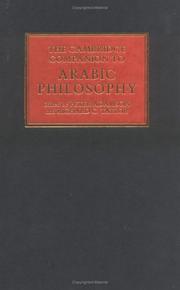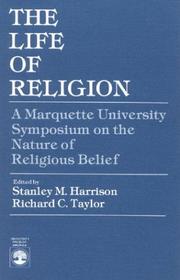| Listing 1 - 10 of 22 | << page >> |
Sort by
|
Book
Abstract | Keywords | Export | Availability | Bookmark
 Loading...
Loading...Choose an application
- Reference Manager
- EndNote
- RefWorks (Direct export to RefWorks)
Book
Year: 1983 Publisher: [S.l.] [s.n.]
Abstract | Keywords | Export | Availability | Bookmark
 Loading...
Loading...Choose an application
- Reference Manager
- EndNote
- RefWorks (Direct export to RefWorks)
Article
Abstract | Keywords | Export | Availability | Bookmark
 Loading...
Loading...Choose an application
- Reference Manager
- EndNote
- RefWorks (Direct export to RefWorks)

ISBN: 0521817439 052152069X 9780521520690 9780521817431 9780511999864 Year: 2005 Publisher: Cambridge: Cambridge university press,
Abstract | Keywords | Export | Availability | Bookmark
 Loading...
Loading...Choose an application
- Reference Manager
- EndNote
- RefWorks (Direct export to RefWorks)
Philosophy written in Arabic and in the Islamic world represents one of the great traditions of Western philosophy. Inspired by Greek philosophical works and the indigenous ideas of Islamic theology, Arabic philosophers from the ninth century onwards put forward ideas of great philosophical and historical importance. This collection of essays, by some of the leading scholars in Arabic philosophy, provides an introduction to the field by way of chapters devoted to individual thinkers (such as al-Farabi, Avicenna and Averroes) or groups, especially during the 'classical' period from the ninth to the twelfth centuries. It also includes chapters on areas of philosophical inquiry across the tradition, such as ethics and metaphysics. Finally, it includes chapters on later Islamic thought, and on the connections between Arabic philosophy and Greek, Jewish, and Latin philosophy. The volume also includes a useful bibliography and a chronology of the most important Arabic thinkers.
Philosophy, Arab --- Philosophy, Arab. --- History of philosophy --- anno 500-1499 --- Arab States --- Arab philosophy --- Arabic philosophy --- Philosophy, Arabic --- Arab states --- 297 <03> --- 297 <03> Islamisme. Mahométisme--Naslagwerken. Referentiewerken --- 297 <03> Islam. Mohammedanisme--Naslagwerken. Referentiewerken --- Islamisme. Mahométisme--Naslagwerken. Referentiewerken --- Islam. Mohammedanisme--Naslagwerken. Referentiewerken --- Acqui 2006
Book
Year: 2005 Publisher: Cambridge ; New York Cambridge University Press
Abstract | Keywords | Export | Availability | Bookmark
 Loading...
Loading...Choose an application
- Reference Manager
- EndNote
- RefWorks (Direct export to RefWorks)
Book
ISBN: 1107485843 0511999860 Year: 2005 Publisher: Cambridge : Cambridge University Press,
Abstract | Keywords | Export | Availability | Bookmark
 Loading...
Loading...Choose an application
- Reference Manager
- EndNote
- RefWorks (Direct export to RefWorks)
Philosophy written in Arabic and in the Islamic world represents one of the great traditions of Western philosophy. Inspired by Greek philosophical works and the indigenous ideas of Islamic theology, Arabic philosophers from the ninth century onwards put forward ideas of great philosophical and historical importance. This collection of essays, by some of the leading scholars in Arabic philosophy, provides an introduction to the field by way of chapters devoted to individual thinkers (such as al-Farabi, Avicenna and Averroes) or groups, especially during the 'classical' period from the ninth to the twelfth centuries. It also includes chapters on areas of philosophical inquiry across the tradition, such as ethics and metaphysics. Finally, it includes chapters on later Islamic thought, and on the connections between Arabic philosophy and Greek, Jewish, and Latin philosophy. The volume also includes a useful bibliography and a chronology of the most important Arabic thinkers.
Book
ISBN: 9782503609379 2503609376 9782503609386 2503609384 Year: 2024 Publisher: Turnhout, Belgium : Brepols Publishers
Abstract | Keywords | Export | Availability | Bookmark
 Loading...
Loading...Choose an application
- Reference Manager
- EndNote
- RefWorks (Direct export to RefWorks)
Albert the Great created a new programme of science in the thirteenth-century Latin world by extensively commenting upon Aristotle’s philosophical corpus and supplementing that corpus with works of his own wherever he saw gaps. What were the preconditions for the emergence of such a comprehensively new scientific agenda and its centuries of success at the University of Paris and Dominican study houses across Europe? One answer is found in the rich Arabic sources that Albert had at his disposal in Latin translation, including Alfarabi, Avicenna, and Averroes, as well as Isaac Israeli, Maimonides, and more.Never before in the history of Albert scholarship has there been a collected volume that examines this inheritance from the Arabic-speaking lands in its role as a major condition for the emergence of Albert’s scientific programme. In the present volume, twelve leading scholars in the field offer studies that range from Albert’s early theological works to his late philosophical writings. The volume focuses on the teachings that Albert actively inherited from the Arabic sources, the ways in which he creatively implemented those teachings into his scientific corpus, and the effects that these implementations had on his own programmatic take on scientia.
Science, Medieval --- Philosophy, Medieval --- Philosophy, Arab --- Sciences médiévales. --- Philosophie médiévale. --- Philosophie arabe. --- Albertus, --- Averroës,
Book
ISBN: 9780415881609 0415881609 1317484339 1315708922 1317484320 9781315708928 9781317484318 9781317484325 9781317484332 9781138478268 1138478261 Year: 2016 Publisher: New York: Routledge,
Abstract | Keywords | Export | Availability | Bookmark
 Loading...
Loading...Choose an application
- Reference Manager
- EndNote
- RefWorks (Direct export to RefWorks)
Recent publications focused on Arabic/Islamic philosophy have traditionally considered this under the history of ideas and Oriental or Islamic studies. There is a need for a comprehensive collection of essays that treats Islamic philosophy as philosophy, and not merely as a conduit of intellectual history for delivering ideas from the ancient Greeks to medieval Christians. With this aim, The Routledge Companion to Islamic Philosophy is conceived as a well-structured and wide-ranging thematic approach, accessible for a broad spectrum of readers, from students to scholars interested in Islamic thought, philosophy, theology, and religious studies
Islamic philosophy. --- Métaphysique --- Intellect (philosophie) --- Épistémologie --- Philosophie arabe --- Islamic philosophy --- Métaphysique. --- Épistémologie. --- Philosophie arabe. --- Philosophy --- Islam --- Islamische Philosophie.
Book
ISBN: 9780874628111 0874628113 0874628121 Year: 2012 Volume: 75 Publisher: Milwaukee: Marquette university press,
Abstract | Keywords | Export | Availability | Bookmark
 Loading...
Loading...Choose an application
- Reference Manager
- EndNote
- RefWorks (Direct export to RefWorks)
Religions --- Abrahamic religions --- Judaism --- Christianity --- Islam --- 291.1 --- Comparative religion --- Denominations, Religious --- Religion, Comparative --- Religions, Comparative --- Religious denominations --- World religions --- Civilization --- Gods --- Religion --- Jews --- Semites --- Mohammedanism --- Muhammadanism --- Muslimism --- Mussulmanism --- Muslims --- Church history --- 291.1 Godsdienstfilosofie --- Godsdienstfilosofie

ISBN: 0819155586 Year: 1986 Publisher: Lanham University press of America
Abstract | Keywords | Export | Availability | Bookmark
 Loading...
Loading...Choose an application
- Reference Manager
- EndNote
- RefWorks (Direct export to RefWorks)
Belief and doubt --- Faith --- Congresses
| Listing 1 - 10 of 22 | << page >> |
Sort by
|

 Search
Search Feedback
Feedback About UniCat
About UniCat  Help
Help News
News